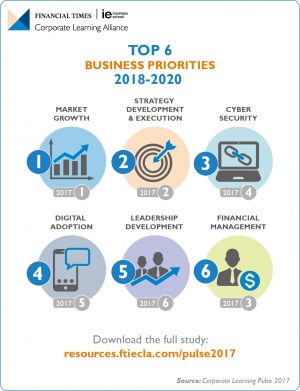Corporate Learning Pulse 2017 Emphasizes Cybersecurity And Digital Disruption As Business Priorities
Changing business priorities will see a greater emphasis on cybersecurity and digitalisation of processes over the next three years, according to almost 1000 senior executives in a survey by Financial Times | IE Business School Corporate Learning Alliance.
The findings come from this year’s Corporate Learning Pulse, a major leadership study conducted among C-Suite executives, HR and Learning & Development professionals working across multiple business sectors in China, Denmark, France, GCC, Germany, Japan, Netherlands, Spain, Sweden and UK.
While the top three business priorities for 2017 were growth, strategy and financial management, the war on cyber-attacks, and the accelerating impact of digital disruption will bring these issues higher in the list of concerns for senior executives in 2018-20.
Top 6 business priorities in 2017:
1. Market growth
2. Strategy development and execution
3. Financial management
4. Cybersecurity
5. Digital adoption
6. Leadership development
Top 6 business priorities over next three years:
1. Market growth
2. Strategy development and execution
3. Cybersecurity
4. Digital adoption
5. Leadership development
6. Financial management
The dominant fear for companies citing cybersecurity as one of their top concerns is, unsurprisingly, the potential treat from hackers. For businesses having to face up to the effects of digital disruption, the top issues are the cloud and the growing impact of technology. Here, global differences are revealed in the study: executives in China and the Middle East are twice as likely to put digital adoption among the top three issues they expect to tackle over the next three years, compared to their European and Japanese counterparts.
Leadership development in a digital world
The study also focused on attitudes to leadership development and what executive education can bring to business strategy. The need to improve management abilities, and address staff retention and development, are the highest priorities for corporate learning over the next three years. When asked which elements of digital strategy are most important, an understanding of data and analysis of trends ranked highest among the survey’s respondents.
There is a clear role here for executive education, according to FT | IE Corporate Learning Alliance. While traditionally it is seen as a route to leadership development, corporate learning can place a stronger focus on real-world business challenges. From the findings of this leadership study, a better understanding of the impact of digital adoption will be higher on the agenda for senior executives over the next three years.
The 2017 Corporate Learning Pulse survey is the second in a series of annual surveys of C-suite executives, HR and L&D professionals.
About FTIECLA
Financial Times | IE Business School Corporate Learning Alliance was formed in 2015 in response to growing calls for more flexible, practical, relevant and timely corporate learning. A joint venture of the Financial Times and IE Business School, it brings world-renowned business information and journalism, leading academic faculty and a global network of educators to co-create customised corporate learning and leadership development programmes in multiple languages, to almost any sector, anywhere in the world. Through expert learning frameworks, innovation and technology, it focuses on achieving measurable learning outcomes.
Press enquiries and further information from:
David Wells, Head of Communications, FT | IE Corporate Learning Alliance
+44 (0)7921 582419; [email protected]
